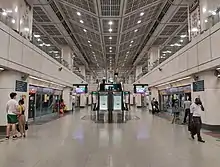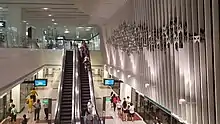Little India MRT station
Little India MRT station is an underground Mass Rapid Transit (MRT) interchange station on the North East (NEL) and Downtown (DTL) lines. The station is located at the junction of Bukit Timah Road and Race Course Road, on the boundary of the planning areas of Kallang and Rochor, Singapore.
NE7 DT12
Little India 小印度 லிட்டில் இந்தியா | ||||||||||||||||
|---|---|---|---|---|---|---|---|---|---|---|---|---|---|---|---|---|
| Mass Rapid Transit (MRT) interchange | ||||||||||||||||
 Exit A of Little India | ||||||||||||||||
| General information | ||||||||||||||||
| Location | 60 Bukit Timah Road Singapore 229900 (NEL) 62A Race Course Road Singapore 229902 (DTL) | |||||||||||||||
| Coordinates | 1°18′24″N 103°50′57″E | |||||||||||||||
| Operated by | SBS Transit Ltd (ComfortDelGro Corporation) | |||||||||||||||
| Line(s) | ||||||||||||||||
| Platforms | 4 (2 island platforms) | |||||||||||||||
| Tracks | 4 | |||||||||||||||
| Connections | Bus, Taxi | |||||||||||||||
| Construction | ||||||||||||||||
| Structure type | Underground | |||||||||||||||
| Platform levels | 2 | |||||||||||||||
| Parking | Yes (KK Women's and Children's Hospital, Tekka Centre) | |||||||||||||||
| Bicycle facilities | Yes (External) | |||||||||||||||
| Accessible | Yes | |||||||||||||||
| History | ||||||||||||||||
| Opened | 20 June 2003 (North East line) 27 December 2015 (Downtown line) | |||||||||||||||
| Electrified | Yes | |||||||||||||||
| Previous names | Kandang Kerbau | |||||||||||||||
| Services | ||||||||||||||||
| ||||||||||||||||
| Location | ||||||||||||||||
_map.svg.png.webp) Little India Little India station in Singapore | ||||||||||||||||
The station serves the ethnic neighbourhood of Little India, and is within walking distances to key locations such as KK Women's and Children's Hospital, Tekka Market, and the Land Transport Authority (LTA) headquarters. Opening on 20 June 2003 as part of the NEL, it later became an interchange station with the DTL when Stage 2 of the line started operations on 27 December 2015.
History
North East line

The station was first announced as "Kandang Kerbau" when the North East line stations were revealed on 6 March 1996. The announcement of the station was 'greatly welcomed' by the residents and shopkeepers in Little India, who hoped that the station will give the Little India district a 'new lease of life' with more developments around the station.[1] Contract 706 for the design and construction of Kandang Kerbau station was awarded to a joint venture between Hyundai Engineering & Construction and Zublin AG at S$311.56 million (US$209.8 million) in April 1997. The contract also includes the construction of the adjacent Farrer Park station.[2]
During the construction, on 7 October 1998, construction workers at the site unearthed human skeletons, alongside discoveries of gold, jewellery, coins and weapons such as machine guns and ammunition. Widely speculated to be massacred victims during the Japanese occupation, the exact origins of the remains remained unknown.[3][4][5][6]
To facilitate the construction, Buffalo Lane, which connects shoppers to the nearby Tekka Centre, was set to be closed. However, the Moulmein Tekka Residents' Committee was concerned that the closure of the road will create inconvenience and road congestion around the station site. Eventually, a metal decking on the road was constructed to allow the public to utilise the road to access Tekka Centre as construction works continued underneath the decking. Although a simple solution, the road decking was needed to be shifted around five times during the construction. As the deck took up a notable amount of space at the worksite, the construction schedule has to be reworked which cost the Land Transport Authority (LTA) about $1 million (US$0.6 million).[7]
Another challenge faced was the construction of the 53-metre (174 ft) underpass from the station to the opposite side of Bukit Timah Road underneath the Bukit Timah Canal. It was initially considered to use the conventional cut-and-cover method to construct the underpass but there were a few problems with the method. The method would involve disrupting the vehicular traffic on Bukit Timah Road, and obstructing the water flow of the canal, which could potentially lead to the flooding of the road, the station and the tunnels. An alternative method – the open-face tunnelling method used by miners – was then employed and was proven successful, without the need to disrupt the traffic on Bukit Timah Road.[8]
The station eventually opened on 20 June 2003 as Little India station.[9][10] The station name change was opposed by the Singapore Heritage Society, which claimed that the new name was 'misleading', suggesting that the area was the 'main abode of Indians'. They had advocated keeping the name "Kandang Kerbau", which means 'buffalo shed' in Malay, as it best reflects the area's heritage.[11]
Downtown line

The DTL station was first announced as part of DTL2 (Downtown line Stage 2) on 15 July 2008.[12] Contract 921 for the design and construction of Little India station and tunnels was awarded to SsangYong Engineering & Construction Co. Ltd at a contract value of S$803.3 million (US$552.3 million) in June 2009, linking the DTL with the NEL at this station. The contract also included the construction of the adjacent Rochor station. Construction of the station was scheduled to commence in the third quarter of 2009 and targeted to be completed by 2015.[13]
The construction of the DTL station involves navigating through the large boulders underground. A 58-metre (190 ft) section of the DTL tunnel below the NEL tunnels have to be manually mined due to the hard ground and the huge boulders.[14] A boulder the size of a double-decker bus was also broken into smaller pieces using specialised hydraulic machinery during the construction.[15] The station opened on 27 December 2015 along with the other DTL Stage 2 stations.[16][17]
Incidents
On 20 December 2012, train services on the North East line was delayed due to a train fault. A statement from SBS Transit said there was no train service between Punggol and Little India due to a train fault. Free bus rides were made available at designated bus stops near affected NEL stations. At about 5.18 pm, all train services resumed. SBS Transit has apologised for the inconvenience caused.[18][19]
On 24 April 2013, a woman known only as Madam Ong had her leg trapped in the gap between the station platform and the train, saying that she was pushed. She suffered minor injuries.[20]
No one was injured in a fire that broke out at a Downtown line worksite along Race Course Road on the evening of 26 March 2014. The Land Transport Authority (LTA) told Yahoo Singapore that a "small fire" had broken out at a "localised area" within the worksite of the Downtown line Little India MRT station. "There is also no impact to DTL2 construction progress," added a spokesperson for the LTA, who added that the fire was put out by 10pm, after it first broke out about half an hour earlier.[21]
Art in Transit
The artwork featured in the North East line section features Memoirs of the Past by S. Chandrasekaran. The animal paintings echos the past of Little India when buffalo stables were seen.[22]
The Downtown line section features "Woven Field" by Grace Tan. It features a landscape of tessellated triangular configurations inspired by the singhaulia woven patterns commonly seen in the traditional sari.
References
- "Residents in N-E corridor happy with station sites". The Straits Times. 6 March 1996. p. 16.
- "Contracts awarded for four NE-Line MRT stations". The Straits Times. 27 April 1997. p. 37.
- "Skeletons found at MRT site". The Straits Times. 7 October 1998. p. 3.
- "Bones to pick". The New Paper. 7 October 1998. p. 3.
- "Who have they dug up?". The New Paper. 7 October 1998. p. 3.
- Leong, Chan (2003). Getting there : the story of the North East Line. Singapore: Land Transport Authority. p. 110. ISBN 981-04-5886-X. OCLC 53383062.
- Leong, Chan (2003). Getting there : the story of the North East Line. Singapore: Land Transport Authority. pp. 115–117. ISBN 981-04-5886-X. OCLC 53383062.
- Leong, Chan (2003). Getting there : the story of the North East Line. Singapore: Land Transport Authority. pp. 117–119. ISBN 981-04-5886-X. OCLC 53383062.
- "Speech By Deputy Prime Minister Mr Lee Hsien Loong At The Official Opening Of The North East Line And Sengkang LRT System on 28 August 2003". www.mot.gov.sg. Archived from the original on 10 September 2020. Retrieved 25 April 2020.
- "Speech By Mr Khaw Boon Wan At The Launch Of The North East Line Art In Transit Programme On 6 June 2003". www.mot.gov.sg. Archived from the original on 10 September 2020. Retrieved 25 April 2020.
- "MRT stations: Get names back on track". The Straits Times. 28 July 2002. p. 47.
- "Downtown Line 2 Station Sites Named". www.lta.gov.sg. Archived from the original on 27 May 2011. Retrieved 17 June 2009.
- "LTA Awards 2 Downtown Line Contracts | Press Room | Land Transport Authority". www.lta.gov.sg. Archived from the original on 25 April 2016.
- Seow, Joanna (27 November 2015). "Little India businesses eagerly await opening of Downtown Line 2 stations". The Straits Times. Retrieved 14 September 2020.
- Feng, Zengkun (2017). Downtown Line : soaring to new heights. Singapore: Straits Times Press Pte Ltd. p. 56. ISBN 978-981-4747-66-0. OCLC 1003852882.
- "Thumbs Up For Downtown Line's Earlier Opening". The Straits Times. Archived from the original on 3 April 2015. Retrieved 28 February 2015.
- "LTA | News Room | News Releases | Downtown Line 2 is Coming to Town….this December". www.lta.gov.sg. Archived from the original on 4 September 2020. Retrieved 24 April 2020.
- "Train service disrupted on NEL due to train fault". Channel NewsAsia. 20 December 2012. Archived from the original on 1 January 2013. Retrieved 20 December 2012.
- "Train service on NEL resumes after disruption". Channel NewsAsia. 20 December 2012. Archived from the original on 30 December 2012. Retrieved 9 April 2014.
- "Woman suffers palm-sized bruise after her leg gets caught in MRT platform gap". STOMP. 1 May 2013. Archived from the original on 6 July 2013. Retrieved 1 May 2013.
- "No injuries in fire at Downtown Line worksite in Little India". Yahoo. 27 March 2014. Archived from the original on 13 April 2014. Retrieved 9 April 2014.
- "Little India MRT Station". SBS Transit. Archived from the original on 2 August 2011. Retrieved 12 November 2011.
External links
- Official website
 Media related to Little India MRT Station at Wikimedia Commons
Media related to Little India MRT Station at Wikimedia Commons